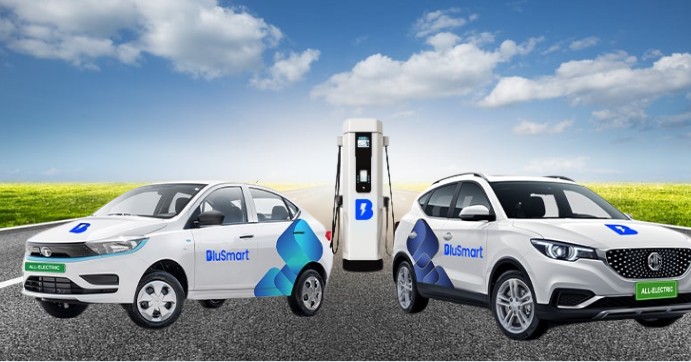April 14, 2025: India’s electric mobility sector is undergoing a quiet, yet telling shift — and BluSmart is at the heart of it. Once touted as a green challenger to traditional ride-hailing giants, the electric vehicle startup is now turning away from its app-based platform to embrace a leaner, fleet-partner model — with none other than Uber.
The strategic pivot underscores a larger trend in India’s EV ecosystem: the rise of fleet-tech over platform ownership, as operational costs, funding challenges, and evolving consumer behavior push startups to rethink their playbooks.
BluSmart Smart Move: A Realignment, Not a Retreat

According to insiders, BluSmart has begun transitioning its fleet of 8,000 electric vehicles to the Uber platform — with the first phase involving 700 to 800 vehicles. Once the full migration is complete, BluSmart will cease running its own ride-hailing app, effectively moving from a consumer-facing brand to a back-end fleet provider.
The move is not just tactical — it’s existential. BluSmart has been facing a monthly cash burn of over ₹20 crore, and a failed $50 million funding attempt earlier this year forced the company into tough decisions.
BluSmart’s reorientation comes amid growing financial stress. Founders Anmol Singh Jaggi and Puneet Singh Jaggi, who also lead Gensol Engineering — a solar EPC firm entangled in its own debt issues — were previously injecting capital into the startup alongside outside investments.
But with funding drying up and a major vehicle sale deal with Refex Industries falling through in March, the firm had little runway left. Salary delays in March further signaled a liquidity crunch.
A spokesperson for Uber, which already works with EV fleet providers like Everest Fleet, Moove, and Lithium Urban, confirmed that they routinely engage third-party partners to expand mobility access — though they declined to comment on any specific deal with BluSmart.
While BluSmart’s exit from the platform model may seem like a step back, it aligns with how the EV ride-hailing space is evolving in India. App-based platforms require massive cash flow, user acquisition costs, and tech upkeep — something that’s proven difficult to scale sustainably, especially for startups.
On the other hand, becoming a fleet partner to an established platform like Uber offers lower burn, better asset utilization, and predictable revenue — a model that’s gaining popularity in the capital-intensive EV market.
In many ways, BluSmart is now echoing its own roots. The company started in 2019 as a fleet operator before launching its consumer-facing platform. This move feels like a return to fundamentals — albeit with a larger fleet, a wider market, and a very different ecosystem.
The pivot comes alongside high-level leadership exits, including the CEO of BluSmart Fleet, its CTO, and the Chief Business Officer (an ex-Uber India executive). The company also recently shut down its Dubai operations and cancelled expansion plans in Saudi Arabia — marking a sharp withdrawal from its international roadmap.
Despite its internal overhaul, BluSmart shared a positive business update: it has completed over 25 million electric rides since launch and has reached an annualised revenue run rate of ₹790 crore (~$93 million) — a reminder that operationally, the business still moves.
What This Means for India’s EV Future
BluSmart’s story is no longer about building the next Uber — it’s about surviving smartly in a market that rewards adaptability over ambition. As India pushes for cleaner mobility and electric adoption, the fleet-as-a-service model may become the norm, with platforms and operators working in tighter sync.
For BluSmart, this pivot could mark not just the end of one chapter, but the start of a more stable — if less spotlighted — role in India’s electric ride revolution.


